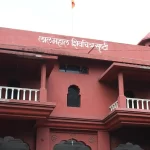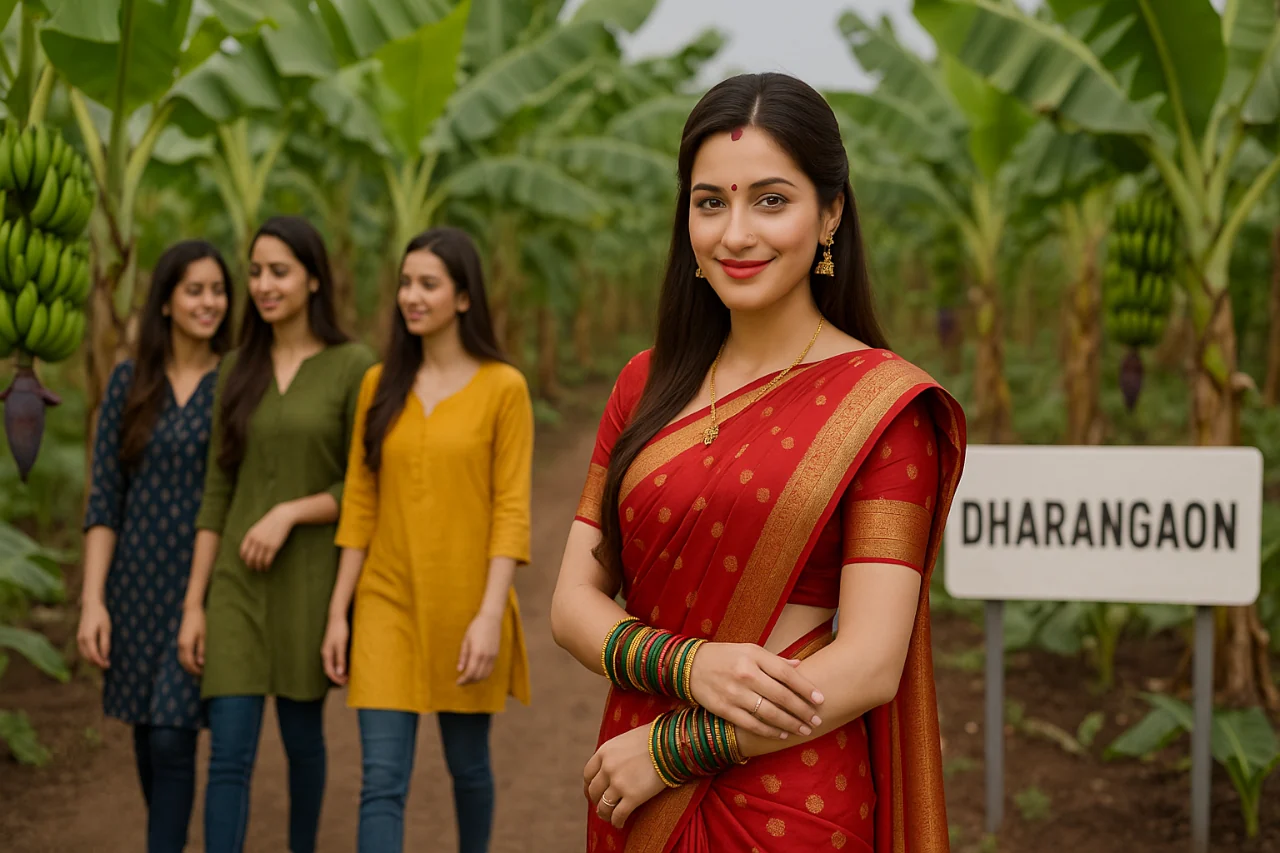Ready to explore Dharangaon? Share your travel plans in the comments or contact us for personalised itineraries!
Discover Dharangaon, Jalgaon District, Maharashtra
🔴 Introduction
Nestled in the fertile plains of Maharashtra’s Jalgaon District, Dharangaon is a town steeped in history, culture, and agricultural prowess. Once a flourishing trade hub under Mughal and Maratha rule, this town today blends its storied past with modern vibrancy. Whether you’re a history buff, a cultural enthusiast, or a traveler seeking offbeat destinations, Dharangaon offers a tapestry of experiences.
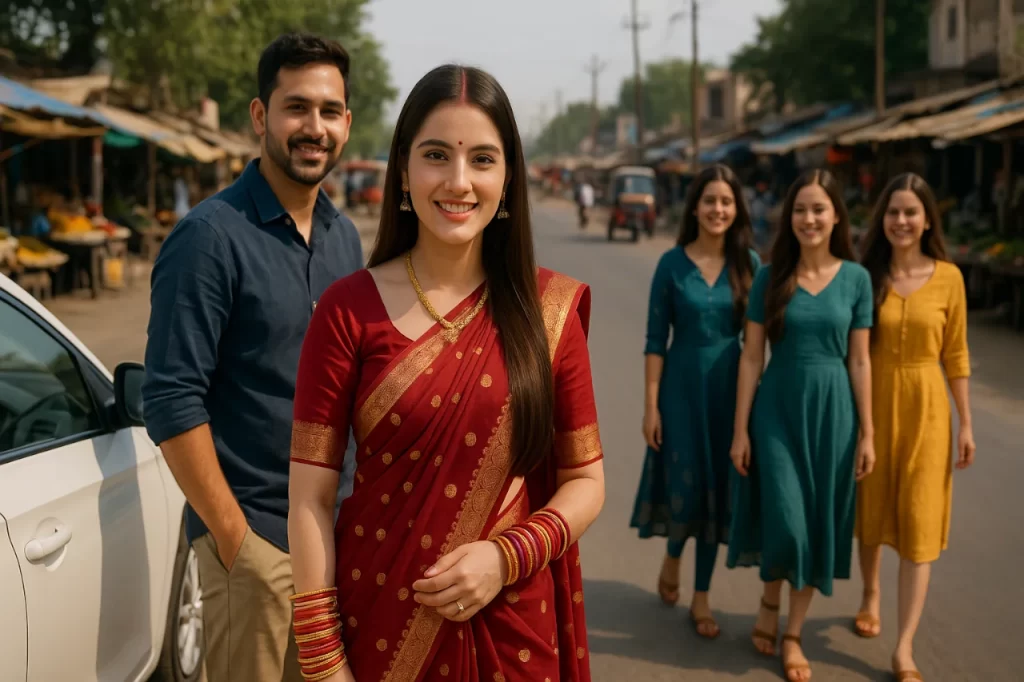
🟢 Detailed Introduction to Dharangaon, Jalgaon District, Maharashtra
🔘 Geographical and Historical Significance
Nestled in the fertile plains of Maharashtra’s Jalgaon District, Dharangaon (21°01′N 75°16′E) is a town steeped in history and agrarian prosperity. Originally known as Mina Nagar, it emerged as a prominent trade hub during the Mughal era (10th century) for its exquisite Jirifaf and Bhiran textiles.
The town’s strategic location made it a contested prize between empires: Maratha king Chhatrapati Shivaji Maharaj recaptured it twice in the 17th century, and it later became a focal point for British colonial experiments in cotton production during the 19th century. Today, Dharangaon serves as a tehsil headquarters and blends its storied past with modern agricultural and industrial growth.
🔘 Demographic and Cultural Landscape
As of the 2011 census, Dharangaon’s population stands at 35,375, with a literacy rate of 85.12%. The town is a mosaic of communities, including Marathas (Patil), Rajputs (Purbhe), Dhangars, and Telis, who primarily converse in Ahirani, a Marathi dialect. Religious diversity is evident, with Hindus (73%) and Muslims (24.8%) coexisting harmoniously, reflected in festivals like Rathautsav, a century-old wooden cart procession, and the Navaratri-Mahalaxmi Fair.
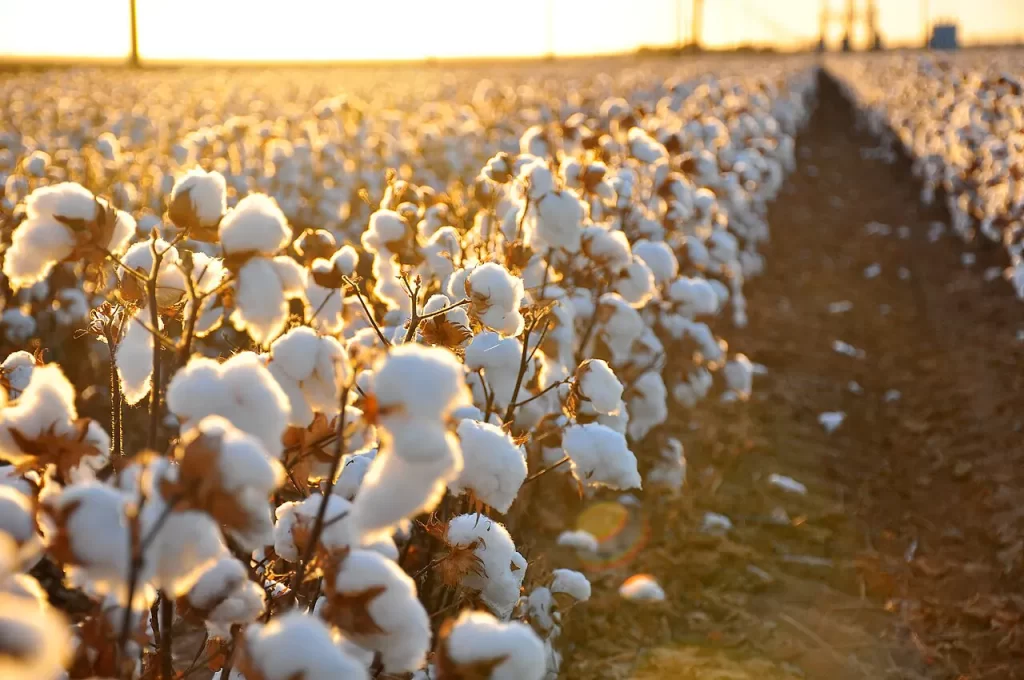
🔘 Economic Backbone: Agriculture and Industry
Agriculture drives Dharangaon’s economy, with Cotton, Sugarcane, Bananas, and Oilseeds as primary crops. The town is renowned for its cotton ginning factories, producing 5 lakh bales annually, with major players like Shreeji Ginning Factory and SK Cotton Industries. Additionally, Zope Bandhu Masala Factory dominates the spice market, offering iconic blends like Shev Bhaji Masala and Panipuri masala.
🔘 Architectural Heritage
Dharangaon’s skyline features a mix of historical and colonial architecture. The Pataleshvar Temple, a 300-year-old Shiva shrine with intricate carvings, hosts vibrant annual festivals. Remnants of British influence include Sir James Outram’s colonial-era residence, a relic of his Bhil Corps initiatives in the 1820s. The town also preserves Mughal-era structures like Aurangzeb’s Dargah, symbolising its syncretic past.
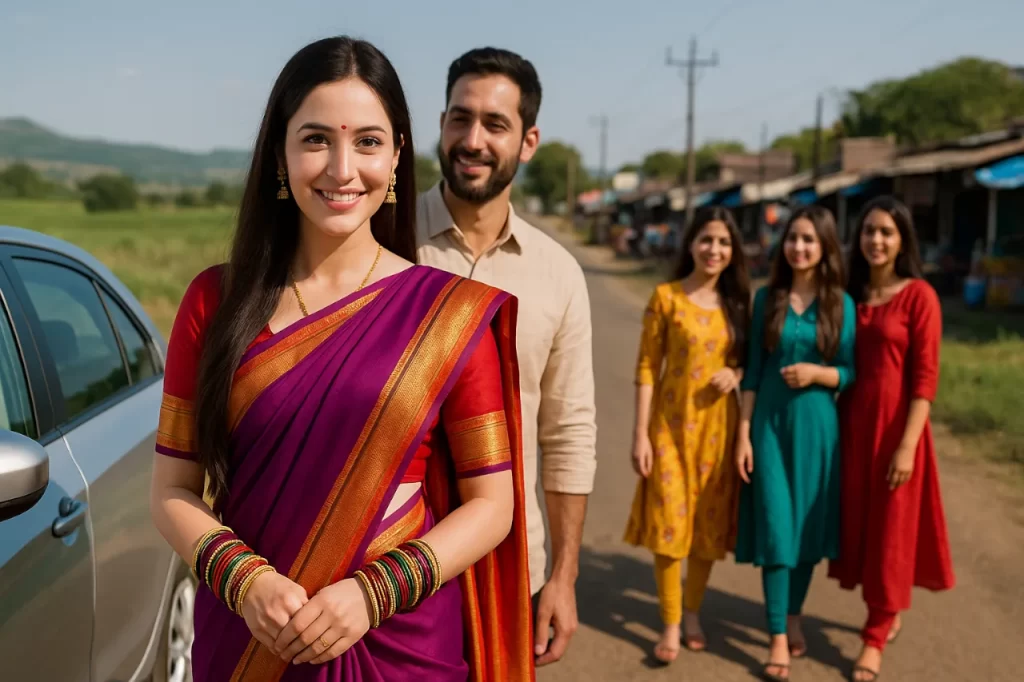
🔘 Connectivity and Climate
Dharangaon is well-connected via the Dharangaon Railway Station (Western Railway line) and Jalgaon Airport (43 km away). Road networks link it to Mumbai (425 km), Pune (325 km), and Nagpur (480 km). The climate is typically tropical, with scorching summers (up to 48°C), monsoon rains (690 mm annually), and mild winters (10°C – 28°C), ideal for travel.
🔘 Education and Notable Figures
The town boasts a literacy rate surpassing the national average, supported by institutions like the Maratha Vidya Prasarak Mandal. Dharangaon is the birthplace of Balkavi, a revered Marathi poet, adding to its cultural prestige.
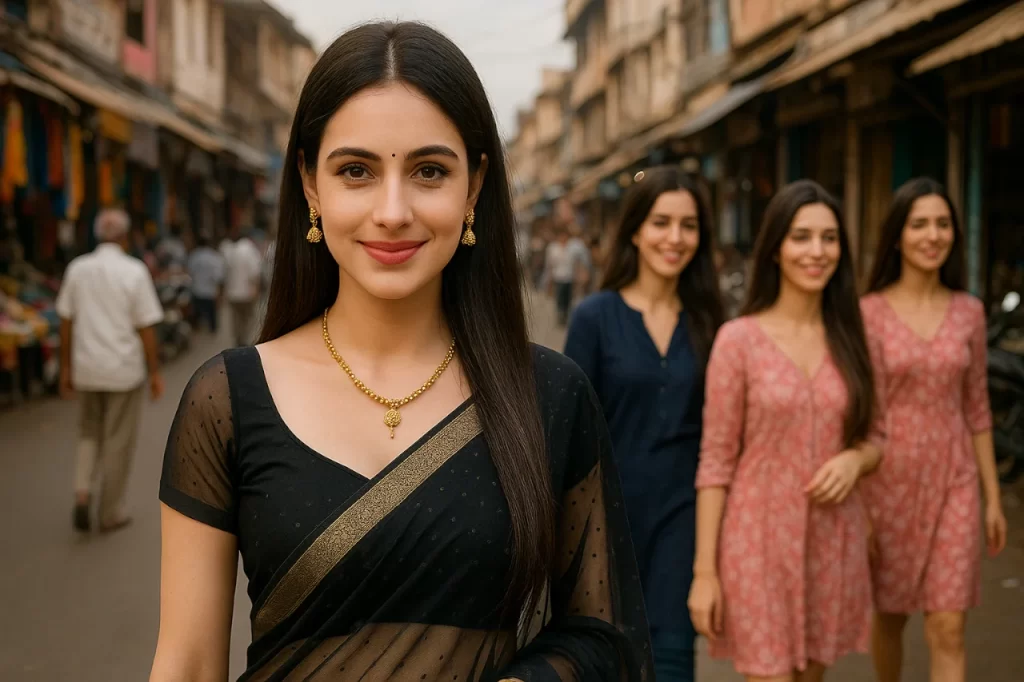
🔘 Local Lifestyle and Handicrafts
Daily life revolves around agrarian rhythms, with bustling markets like Dharangaon Bazaar offering handwoven cotton textiles and traditional wooden carts (Vahanas)—a craft preserved for over a century. The town’s narrow, winding streets and stone-mortar houses reflect its historical charm.
Also Read
Nashik, Maharashtra – Where Spirituality Meets Splendour
🔘 Challenges and Modernisation
Despite its growth, Dharangaon faces issues like water scarcity, relying on seasonal lakes for cattle and laundry. Recent urbanisation has led to villa constructions, blending modernity with tradition.
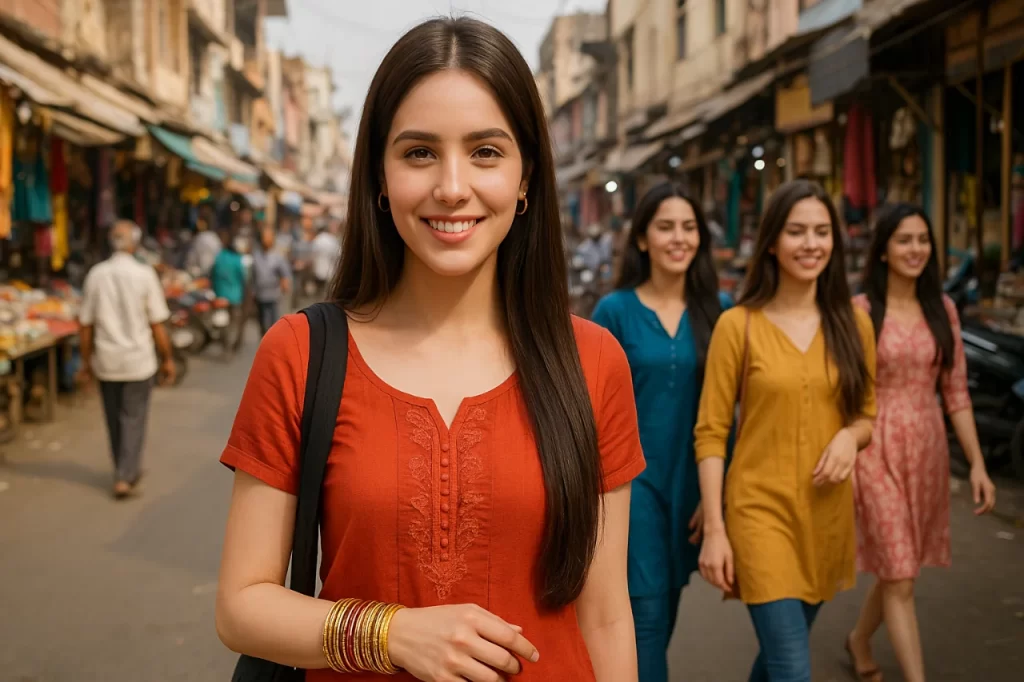
🟣 Section-by-Section Breakdown:
👉 Historical Legacy: From Mughal conquests to British experiments in cotton.
👉 Architectural Gems: Temples, dargahs, and colonial remnants.
👉 Cultural Tapestry: Festivals, dialects, and local crafts.
👉 Travel Logistics: Distances from major cities, weather, and itineraries.
👉 Local Economy: Cotton, spices, and agrarian traditions.
👉 Demographics & Lifestyle: Community diversity and daily rhythms.
Let’s dive into the soul of Dharangaon!
🟠 Detailed Section Breakdown:
⭕ History of Dharangaon: From Mina Nagar to Modernity
Dharangaon’s roots trace back to the 10th century, when it was known as Mina Nagar. During the Mughal era, it gained fame for its exquisite Jirifaf and Bhiran textiles. The town’s strategic location made it a battleground for empires:
✦ Maratha Era: Chhatrapati Shivaji Maharaj reclaimed Dharangaon twice (1675 and 1679) from rival forces, cementing its importance.
✦ British Influence: Post-1818, the British established cotton ginning factories here, though early experiments with screw presses failed due to high costs.
✦ Colonial Experiments: Lieutenant James Outram’s Bhil Corps (1825–1830) and American-led cotton initiatives marked Dharangaon’s industrial evolution.
➜ Fun Fact: The town’s Wooden cart-making tradition (Rathautsav) dates back 100+ years!
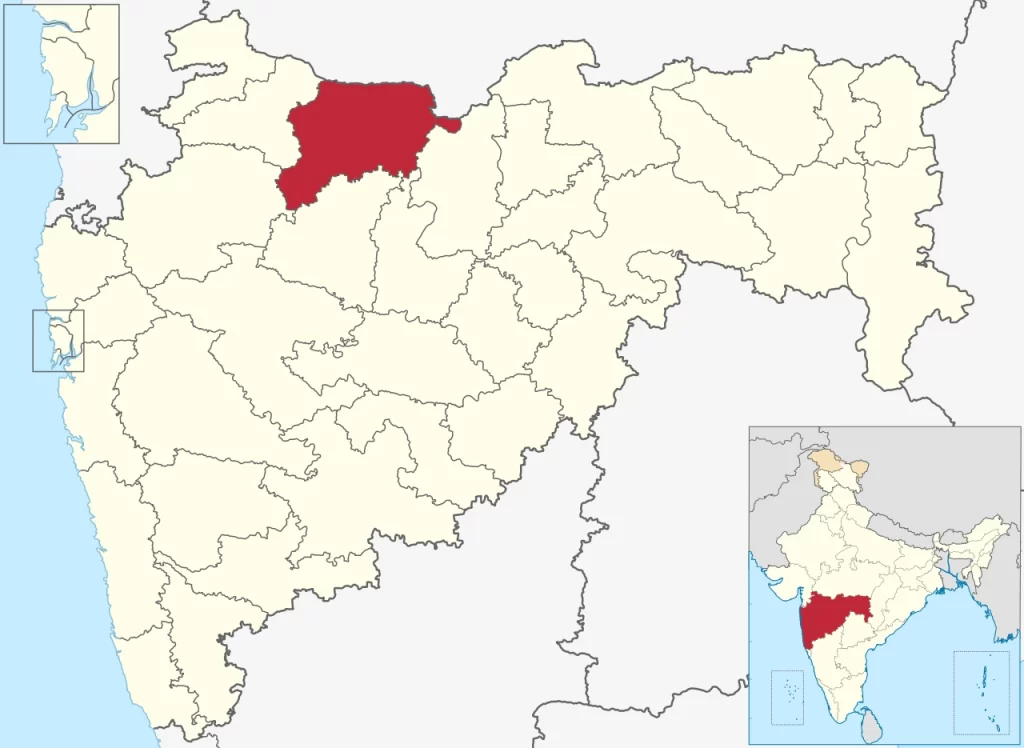
⭕ Architectural Marvels: Temples, Dargahs, and Colonial Relics
Dharangaon’s skyline tells stories of syncretism and resilience:
👉 Pataleshvar Temple: A 300-year-old Shiva shrine with intricate carvings.
👉 Aurangzeb’s Dargah: A Mughal-era tomb reflecting the town’s Islamic heritage.
👉 Sir James Outram’s Residence: A dilapidated colonial-era building symbolising British administrative history.
➜ Local Insight: “The Pataleshvar Temple’s annual festival draws thousands. It’s not just a shrine—it’s where our community gathers”, says Ramesh Patil, a lifelong resident.
⭕ How to Reach Dharangaon
➸ By Air: Nearest airport: Jalgaon Airport (43 km).
➸ By Rail: Dharangaon Railway Station connects to Mumbai, Pune, and Bhusawal Junction.
➸ By Road:
✦ Mumbai: 425 km (NH160)
✦ Pune: 325 km (NH60)
✦ Nagpur: 480 km (NH53)
➜ Pro Tip: Rent a car for scenic drives through Maharashtra’s cotton fields!
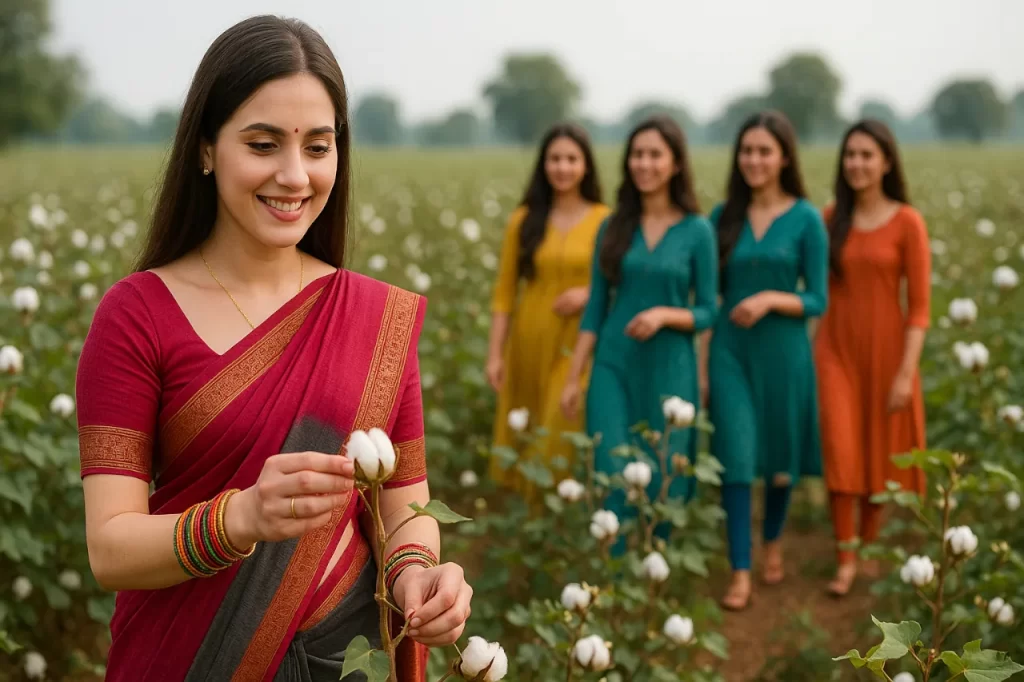
⭕ Climate & Best Time to Visit
✦ Summer (March–June): Scorching (up to 48°C) but ideal for early-morning heritage walks.
✦ Monsoon (July–September): Lush greenery and 690 mm rainfall—perfect for photography.
✦ Winter (October–February): Pleasant (10°C – 28°C), ideal for exploring.
➜ Local Weather Insight: “Winters are magical here. The fog over the Tapi River is unforgettable”, shares travel blogger Anjali Deshmukh.
⭕ Cultural Deep Dive: Festivals, Food, and Crafts
➸ Festivals:
✦ Rathautsav: A century-old wooden cart procession.
✦ Navaratri-Mahalaxmi Fair: Celebrates local goddesses with music and dance.
➸ Cuisine: Try Zope Bandhu Masala — a fiery blend used in local dishes like Shev Bhaji.
➸ Handicrafts: Traditional cotton weaving (100+ active looms).
➜ Interview Highlight: “Our masala recipes are passed down generations. Each spice tells a story”, says Zope Bandhu’s owner.
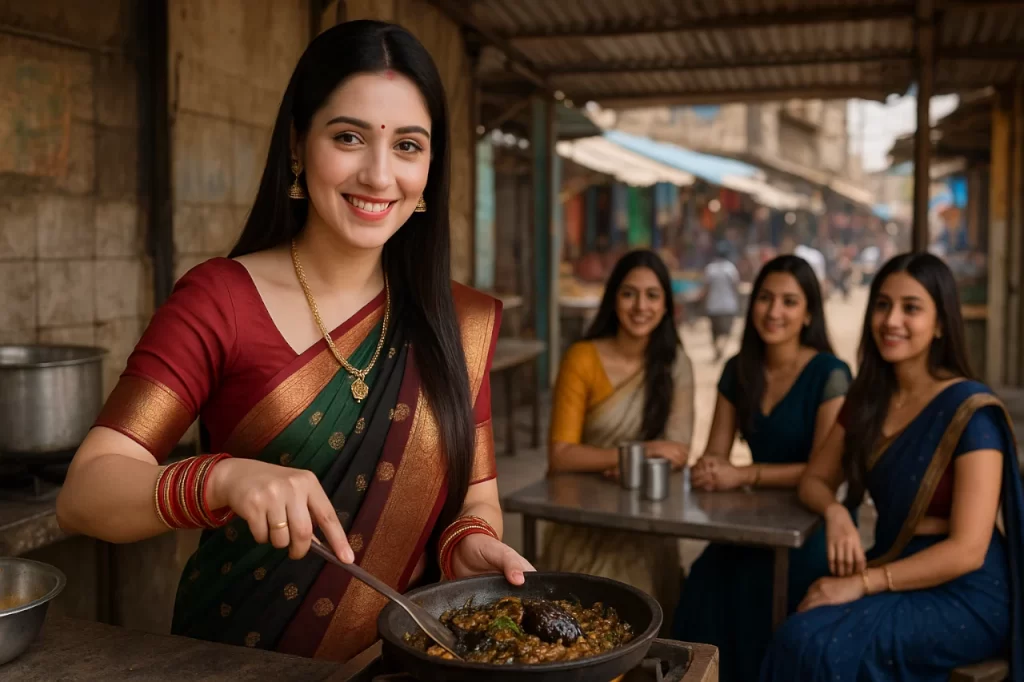
✅︎ Best Places for Refreshments with Authentic Local Food (A Section with Granular Details)
⛔ Zope Bandhu Masala Factory
✦ Specialties: Shev Bhaji Masala (a spicy blend for potato-based curries), Lahsun Chutney (garlic dip), and Panipuri Masala.
✦ Experience: Tour the factory to witness traditional spice grinding techniques.
✦ Location: Central Dharangaon; contact via Jalgaon District portal.
⛔ Dharangaon Bazaar
➸ Street Food:
✦ Banana Bhajis: Crispy fritters made from local bananas.
✦ Pithla Bhakri: A rustic Maharashtrian dish of chickpea flour curry with millet bread.
✦ Puran Poli: Sweet flatbread stuffed with lentils and jaggery, sold during festivals.
⛔ Local Sweet Shops
✦ Kaju Katli: Cashew-based sweets from Shree Krishna Sweets.
✦ Shengdana Chikki: Peanut brittle, a regional specialty.
⭕ Nearby Attractions
🎯 Ajanta Caves: UNESCO site (57 km away).
🎯 Gandhi Teerth: Museum dedicated to Mahatma Gandhi (Jalgaon).
🎯 Unapdev Hot Springs: Sacred site in Satpuda foothills.
➜ Itinerary Suggestion: Spend a morning at Ajanta, lunch in Jalgaon, and sunset by the Tapi River!
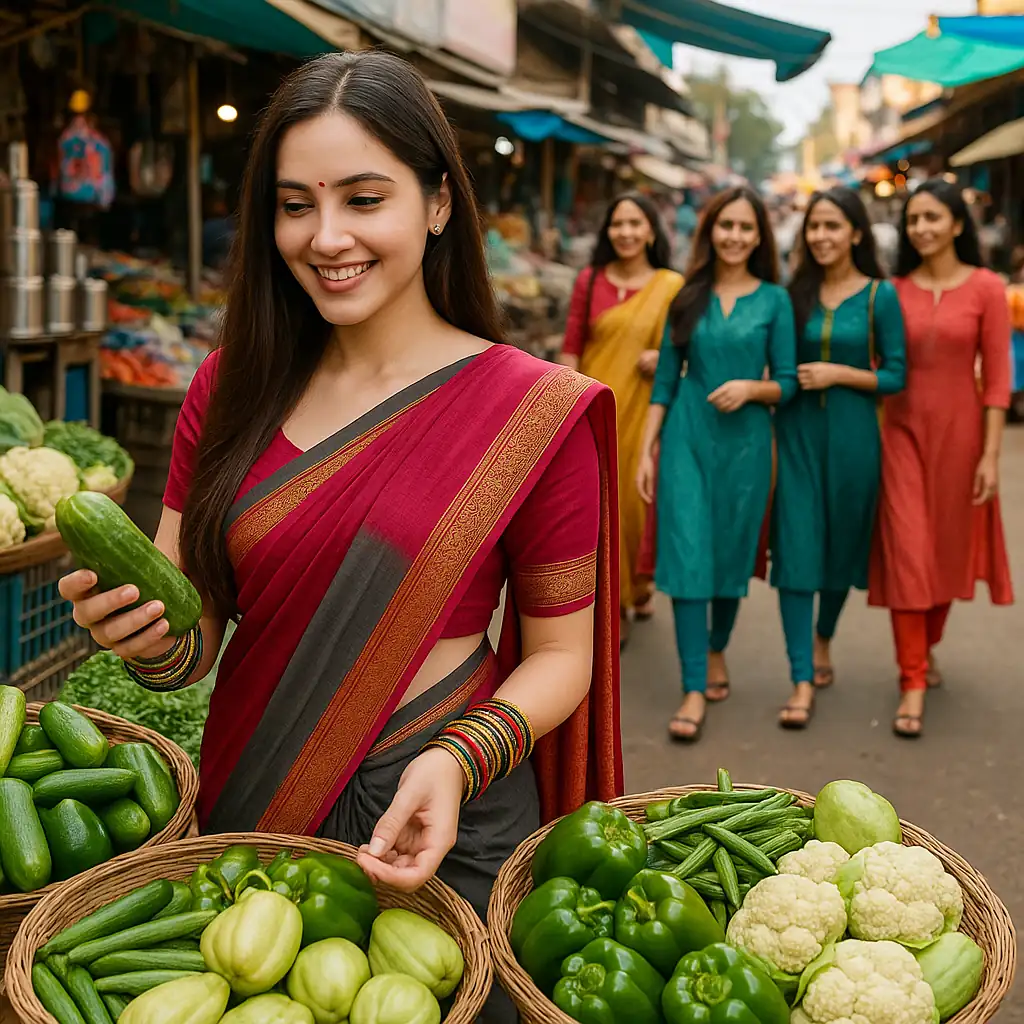
✅︎ Best Places to Visit in and Around Dharangaon (A Section with Granular Details)
👉 Pataleshvar Temple 🕉️
✦ Highlights: Intricate stone carvings depicting mythological scenes.
✦ Festivals: Annual Shiva Rath Yatra attracts thousands.
✦ Location: Central Dharangaon.
👉 Parola Fort (16th Century) ⛰
✦ Architecture: Features the iconic Delhi Darwaza gate and bastions overlooking the Bori River.
✦ History: Built by the Koli kings; later occupied by Marathas.
✦ Distance: 30 km from Dharangaon.
👉 Shree Kshetra Padmalaya 🛕
✦ Significance: A revered Ganesha temple with Swayambhu (Self-manifested) Idols.
✦ Mythology: Linked to Bhima’s legend; features a lotus pond and medicinal herbs.
✦ Distance: 30 km from Jalgaon.
👉 Gandhi Teerth (Jalgaon)
✦ Exhibits: Rare photographs and letters of Mahatma Gandhi.
✦ Activities: Interactive workshops on Gandhian philosophy.
👉 Unapdev Hot Springs
✦ Wellness: Sulfur-rich waters believed to heal skin ailments.
✦ Location: Satpuda foothills, 60 km from Dharangaon.
👉 Ajanta Caves (UNESCO Site) ⛰
✦ Artistry: 2nd-century Buddhist rock-cut caves with frescoes.
✦ Distance: 57 km from Dharangaon.
⭕ Demographics & Economy
✦ Population: 35,375 (2011), with 73% Hindus and 25% Muslims.
✦ Languages: Ahirani (local dialect), Marathi, Hindi.
✦ Economy: Cotton ginning (5 lakh bales/year), Banana Farming, and Spice production.
➜ Notable Resident: Balkavi, the renowned Marathi poet, was born here.
🟤 FAQs
What’s the best time to visit Dharangaon?
October–February for cool weather.
How far is Dharangaon from Mumbai?
~425 km by road.
What local dishes should I try?
Vangya che Bharit, Misal Pav and Lahsun Chutney.
🔵 Conclusion:
Dharangaon is more than a dot on Maharashtra’s map—it’s a living museum of history, culture, and resilience. From its Mughal-era textiles to bustling spice markets, every corner whispers tales of the past. Pack your bags, and let Dharangaon surprise you!
This guide synthesises Dharangaon’s rich heritage, culinary delights, and key attractions, ensuring an immersive travel experience. For further details, explore the cited sources.
🟡 Sources:
Image Credit
✦ Wikimedia Commons – Jalgaon in Maharashtra (India)
✦ Wikimedia Commons – Cotton field kv17
For more information, you can visit our website: ExploreXP
Loved this guide? Pin it for later or tag us in your Dharangaon adventures! 🌾✨
Latest Posts
- Jalna, Maharashtra – Where Marathwada Region’s History Meets Modernity
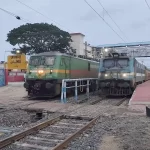
- Dapoli – Ratnagiri District, Maharashtra: Where Coastal Charm Meets Colonial Legacy
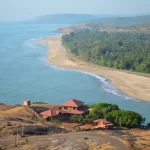
- Exploring Beed, Maharashtra – History, Culture & Travel Guide
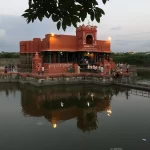
- Chandrapur Fort – Unraveling Maharashtra’s Timeless Legacy
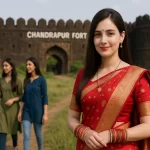
- Explore Dharangaon, Maharashtra: Where History Meets Heritage in the Heart of Maharashtra

- Lal Mahal: Pune’s Timeless Tribute to Chhatrapati Shivaji Maharaj’s Legacy
